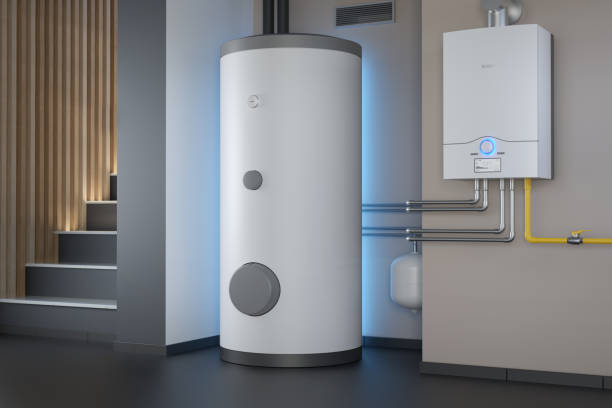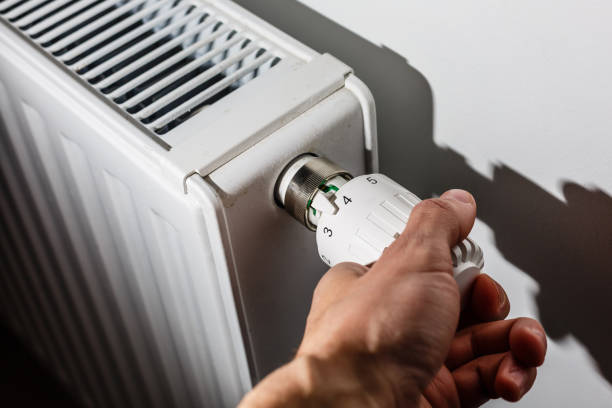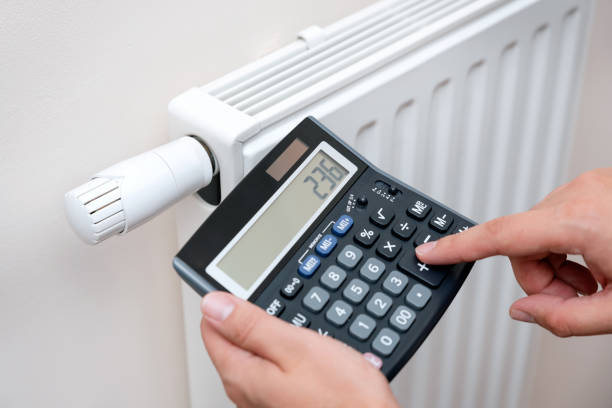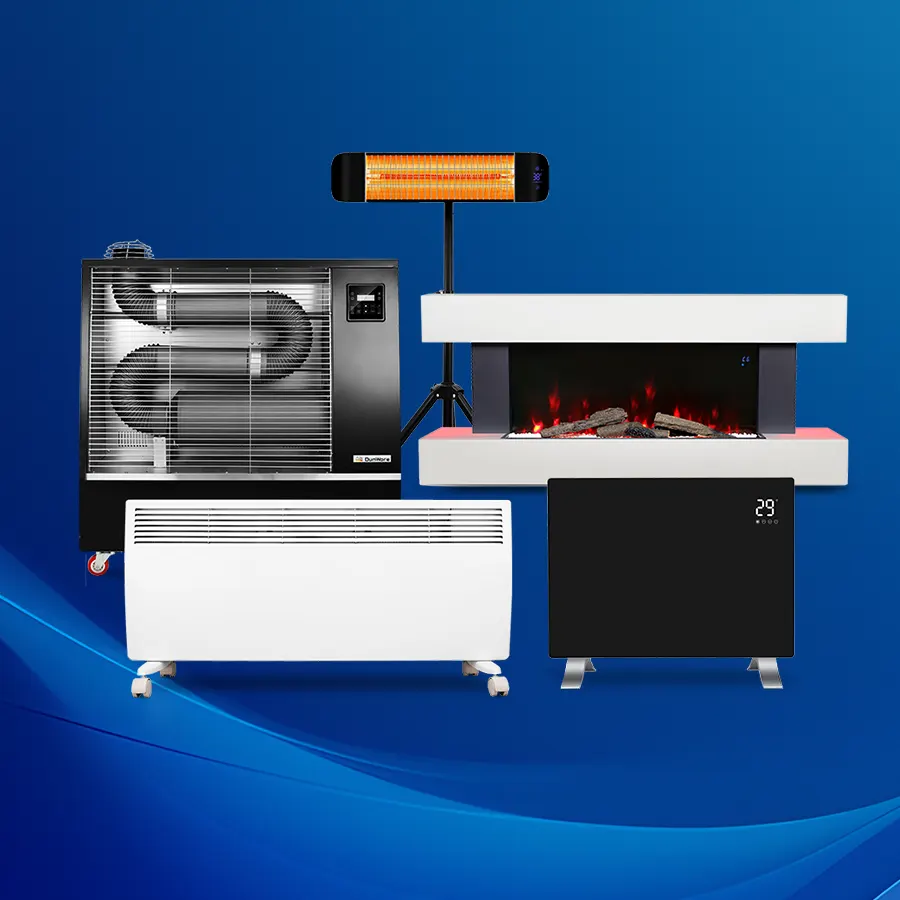Choosing the right heating system for your home is a crucial decision that impacts comfort, ประสิทธิภาพการใช้พลังงาน, and monthly expenses. Two primary options are gas heaters and เครื่องทำความร้อนไฟฟ้า, each with its own set of advantages and considerations.
This comprehensive guide delves into the intricacies of both systems, providing detailed insights to help you make an informed choice.
How Do I Know If My Heater Uses Gas or Electric?

Identifying whether your heating system is powered by gas or electricity is essential for maintenance, troubleshooting, and safety. Here are detailed steps to determine the type of heater in your home:
Inspect the Heater Unit
Gas Heaters:
- Presence of a Pilot Light: Gas heaters often have a small flame visible through a viewing window, indicating a pilot light.
- Gas Supply Line: A metal or flexible gas line connected to the unit signifies gas usage.
เครื่องทำความร้อนไฟฟ้า:
- Electrical Wiring: Electric heaters are connected via electrical wires without any gas lines.
- Absence of Combustion Components: No burners or pilot lights are present in electric units.
Check the Thermostat Settings
- Gas Heaters: These may have settings like “pilot,” “on,” หรือ “off,” corresponding to gas flow control.
- เครื่องทำความร้อนไฟฟ้า: Typically feature straightforward temperature settings without gas-specific options.
Review Utility Bills
- Gas Heaters: Increased gas consumption during colder months indicates a gas heating system.
- เครื่องทำความร้อนไฟฟ้า: Higher electricity usage during heating periods suggests electric heating.
Consult the User Manual or Manufacturer’s Label
The heater’s model number and specifications, often found on a label or in the manual, will indicate the energy source.
Gas vs. เครื่องทำความร้อนไฟฟ้า: พวกเขาทำงานอย่างไร

Understanding the operational mechanisms of gas and electric heaters provides insight into their efficiency, maintenance needs, and suitability for different environments.
How Gas Heaters Work
Gas heaters utilize natural gas or propane as fuel. The process involves:
- Ignition: A pilot light or electronic ignition system lights the burner.
- Combustion: Burners mix gas with air, creating a flame that heats a heat exchanger.
- Heat Distribution: Air is blown over the heated exchanger, warming it before being circulated through ducts or radiators into living spaces.
- Ventilation: Combustion byproducts, including carbon monoxide, are expelled through a venting system to the outside.
Pros of Gas Heaters
- Cost-Effective Fuel
In regions where natural gas is affordable, operating costs are lower compared to electricity.
- เครื่องทำความร้อนอย่างรวดเร็ว
Gas heaters can quickly raise indoor temperatures, making them suitable for larger areas or colder climates.
- Operational During Power Outages
Many gas heaters can function without electricity, providing heat during electrical outages.
Cons of Gas Heaters
- Higher Initial Investment
Installation costs are elevated due to the need for gas lines and ventilation systems.
- Safety Concerns
Risks include gas leaks and carbon monoxide poisoning, necessitating regular maintenance and functioning detectors.
- ผลกระทบต่อสิ่งแวดล้อม
Burning fossil fuels contributes to greenhouse gas emissions.
How Electric Heaters Work
Electric heaters convert electrical energy into heat through resistive heating elements. The operation includes:
- Electrical Resistance
Electric current passes through high-resistance materials, generating heat.
- การถ่ายเทความร้อน
The heat is emitted directly into the room (in space heaters) or transferred to air/water circulated by fans or pumps in central systems.
- Thermostat Regulation
Built-in thermostats control the temperature by regulating the electrical flow to the heating elements.
Pros of Electric Heaters
- Lower Installation Costs
A simpler setup without the need for gas lines or vents reduces initial expenses.
- Safety and Cleanliness
No combustion means no emissions or risk of gas leaks, resulting in cleaner indoor air quality.
- ประสิทธิภาพการใช้พลังงาน
Electric heaters can achieve near 100% ประสิทธิภาพ, as all the electrical energy is converted into heat.
Cons of Electric Heaters
- Higher Operating Costs
Electricity is often more expensive than natural gas, leading to increased monthly bills.
- Slower Heating
Electric systems may take longer to reach desired temperatures, especially in larger spaces.
- Dependence on Electricity
Functionality is lost during power outages unless backed by a generator.
Is Electric Heating Better Than Gas?

Whether electric heating is superior to gas heating depends on various factors, including cost, environmental impact, ประสิทธิภาพ, and personal preferences.
การพิจารณาต้นทุน
Installation Costs
- Gas Heaters: Require professional gas lines and ventilation installation, increasing initial expenses.
- เครื่องทำความร้อนไฟฟ้า: Generally involve simpler installations, often at a lower cost.
Operating Costs
- Gas Heaters: Typically have lower fuel costs, especially in areas where natural gas is inexpensive.
- เครื่องทำความร้อนไฟฟ้า: Higher electricity rates can lead to increased operating expenses.
Efficiency and Performance
Gas Heaters
- More effective for larger homes and colder climates, as they heat spaces quickly.
- More efficient in terms of heat output per unit of energy compared to standard electric heaters.
เครื่องทำความร้อนไฟฟ้า
- Convert nearly 100% of electricity into heat, making them highly efficient in terms of energy use.
- Work well for smaller spaces and areas with milder winters.
ผลกระทบต่อสิ่งแวดล้อม
Gas Heaters
- Use fossil fuels, leading to carbon emissions and contributing to environmental pollution.
- Energy-efficient models and natural gas alternatives (like biogas) can reduce environmental impact.
เครื่องทำความร้อนไฟฟ้า
- No direct emissions, making them cleaner for indoor air quality.
- If powered by renewable energy (solar, wind, hydro), they are more environmentally friendly than gas heaters.
ข้อควรพิจารณาด้านความปลอดภัย
Gas Heaters
- Risk of carbon monoxide leaks, gas leaks, and fire hazards if not maintained properly.
- Requires ventilation systems and CO detectors to ensure safe operation.
เครื่องทำความร้อนไฟฟ้า
- Generally safer as they do not produce emissions or require fuel storage.
- Risk of electrical fires if improperly used or plugged into overloaded circuits.
Best Use Cases
| Factor | Gas Heater | เครื่องทำความร้อนไฟฟ้า |
| Best for | Large spaces, cold climates | Small spaces, moderate climates |
| Initial Cost | สูงกว่า (requires gas lines) | ต่ำกว่า (simple installation) |
| Operating Cost | ต่ำกว่า (cheaper fuel source) | สูงกว่า (electricity cost varies) |
| ประสิทธิภาพ | Higher heat output per unit | 100% ประหยัดพลังงาน |
| ความเป็นมิตรกับสิ่งแวดล้อม | Produces emissions | Cleaner (depends on power source) |
| ความปลอดภัย | CO and gas leak risks | Lower risk, but fire hazard possible |
Electric Heat vs. Gas Heat: Monthly Cost Comparison

One of the biggest concerns for homeowners is the cost of heating every month. The actual cost depends on:
- Energy prices in your region (natural gas vs. electricity rates).
- Heating system efficiency (older models tend to be less efficient).
- Home insulation and climate (poor insulation leads to higher energy use).
Average Monthly Cost Estimates
| Heating System | Estimated Monthly Cost (Average Home) |
| Gas Heater | $50 – $150 (depending on gas prices) |
| เครื่องทำความร้อนไฟฟ้า | $100 – $300 (depends on electricity rates) |
Gas is usually cheaper than electricity, but high-efficiency electric heat pumps can reduce costs. Electric heating in well-insulated homes (with heat pumps or infrared heaters) can be cost-effective.
How to Reduce Heating Costs
For Gas Heaters
- Upgrade to an energy-efficient model with a high AFUE rating.
- Regular maintenance and duct sealing prevents heat loss.
- Use a programmable thermostat to optimize heating times.
For Electric Heaters
- Consider heat pumps for better efficiency.
- Use zone heating (space heaters for specific areas instead of whole-home heating).
- Invest in solar panels to offset electricity costs
Best Way to Heat an Enclosed Porch

Enclosed porches are unique spaces that may not be connected to a home’s central heating system. Here are the best ways to efficiently heat this space:
Portable Outdoor Space Heater
- Propane or Natural Gas Heaters
Ideal for outdoor and semi-enclosed spaces. Provide strong, radiant heat but require ventilation.
- Electric Infrared Heaters
Emit direct warmth, making them great for small enclosed porches. Energy-efficient and safe for indoor use.
Electric Baseboard or Wall Heaters
- Permanent heating solution for porches with electrical access.
- Works well for moderate climates where extreme cold is not an issue.
Heat Pumps or Mini-Split Systems
- Best long-term option for fully enclosed porches.
- Provides heating in winter and cooling in summer.
- Higher initial cost but energy-efficient over time.
Choose กลม= Choose Success
กับ 14+ years of unwavering dedication, Yika กลายเป็นผู้ผลิตเครื่องทำความร้อนไฟฟ้าและเครื่องทำความเย็นในประเทศจีน. เรามีความเชี่ยวชาญในการส่งมอบโซลูชั่นการทำความร้อนและความเย็นที่ยั่งยืนและประหยัดค่าใช้จ่ายที่ออกแบบมาสำหรับการใช้งานทั้งในครัวเรือนและอุตสาหกรรม.
Get custom/OEM เครื่องทำความร้อนไฟฟ้า, เตาผิงไฟฟ้าแบบกำหนดเอง, and custom แอร์คูลเลอร์ at Yika. เรานำเสนอโซลูชันแบบกำหนดเองแบบครบวงจรที่ครอบคลุมรูปลักษณ์ภายนอก, การติดตั้ง, วิธีการควบคุม, ฟังก์ชั่น, ประเภทปลั๊ก, บรรจุภัณฑ์, และอีกมาก. ติดต่อเราเพื่อขอใบเสนอราคาที่ดีที่สุด!
บทสรุป
Choosing between a gas vs. electric heater depends on multiple factors, including cost, ประสิทธิภาพ, safety, and environmental impact.
- If you prioritize lower monthly costs and fast heating, gas may be better.
- If you want a cleaner, safer, and low-maintenance option, electric heating is ideal.
For portable outdoor space heaters or heating enclosed porches, electric infrared or propane heaters are excellent choices.
Final Tip:
Before making a decision, consider your climate, งบประมาณ, and long-term energy goals to choose the best heating system for your needs.





















